- Blog
- Europe EV Sales 2024 - Report and Market Forecast
Europe EV Sales 2024 Report and Market Forecast
Seeing some shifts in the used EVs market? You’re not alone. Read about the latest trends, challenges, and opportunities to keep your dealership successful.
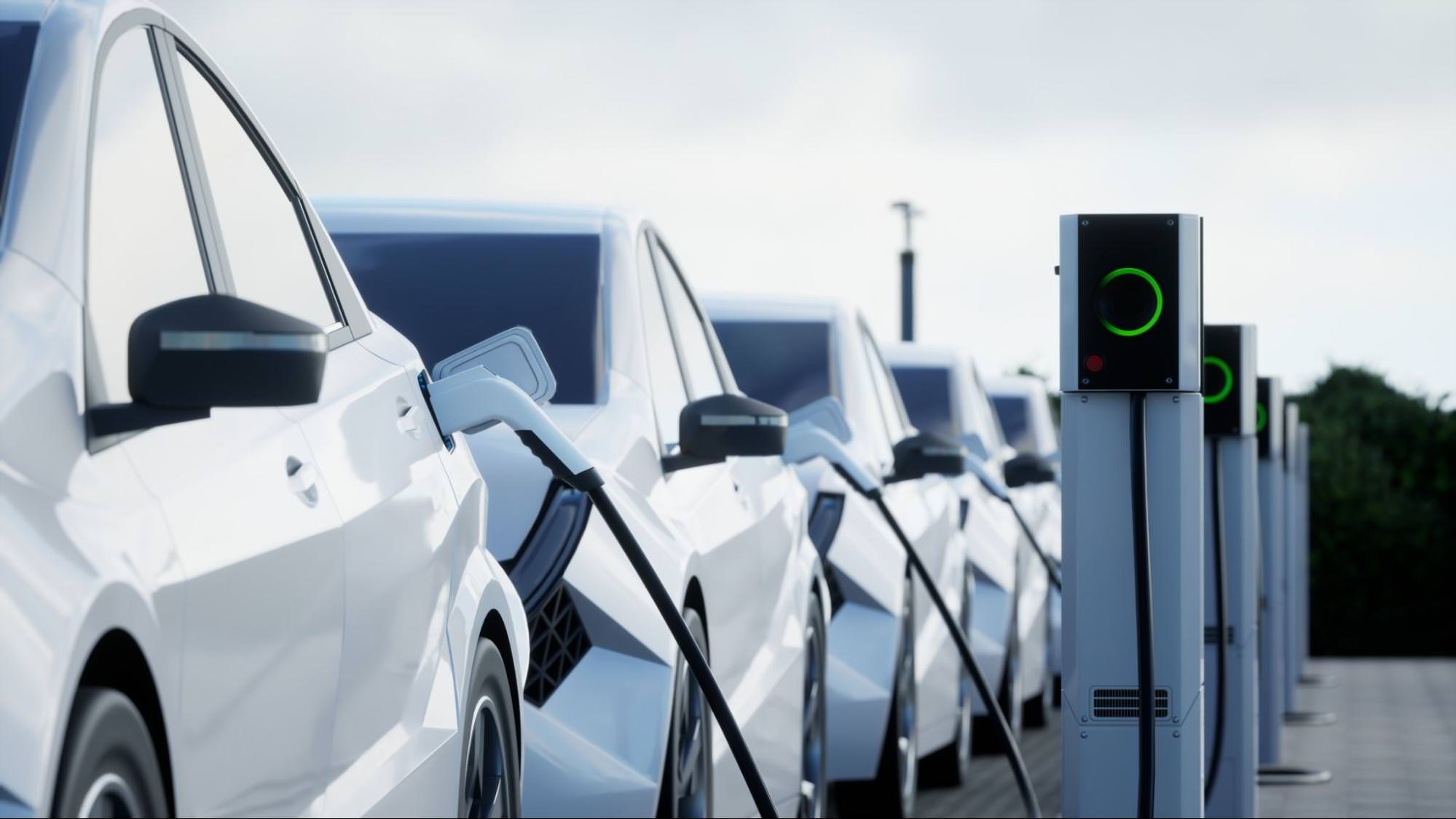
Back in 2021, EVs seemed unstoppable in Europe, with record sales and strong demand. Fast forward to 2024, and that momentum has slowed down.
The market is facing new challenges, with prices dropping and the excitement cooling off a bit.
But, how severe is this slowdown really? And more importantly, how can you, as a used car dealer, adapt to the situation?
In this analysis, we’ll break down what’s happening in the European EV market in 2024 and what it means for dealers like you. While sales may have dipped, there are still plenty of opportunities to keep your business moving forward.
A summary of 2024 EV sales in Europe
If you want to be ahead of the competition, you’ll have to stay on top of market trends. Let’s see what 2024 has been about so far in the world of EVs.
How do Q1 and Q2 of 2024 look in comparison with 2023?
Just last year, EVs were the way to go for European car dealers. This year, however, the sales have been sluggish, with a noticeable decline in new BEV (Battery electric vehicle) registrations.
According to FleetEurope, overall BEV sales across Europe dropped by 6% because lower resale values and general market uncertainty have made buyers more cautious.
So, while the drop of 6% may not seem huge, it still reflects a shift in buyer behavior. People are thinking twice before jumping into the EV market.
The situation has been particularly challenging for used car dealers.
De Tijd reports that a four-year-old Tesla Model 3 with 120,000 kilometers is now selling for only 30-35% of its original price, which is much lower than the expected 45%.
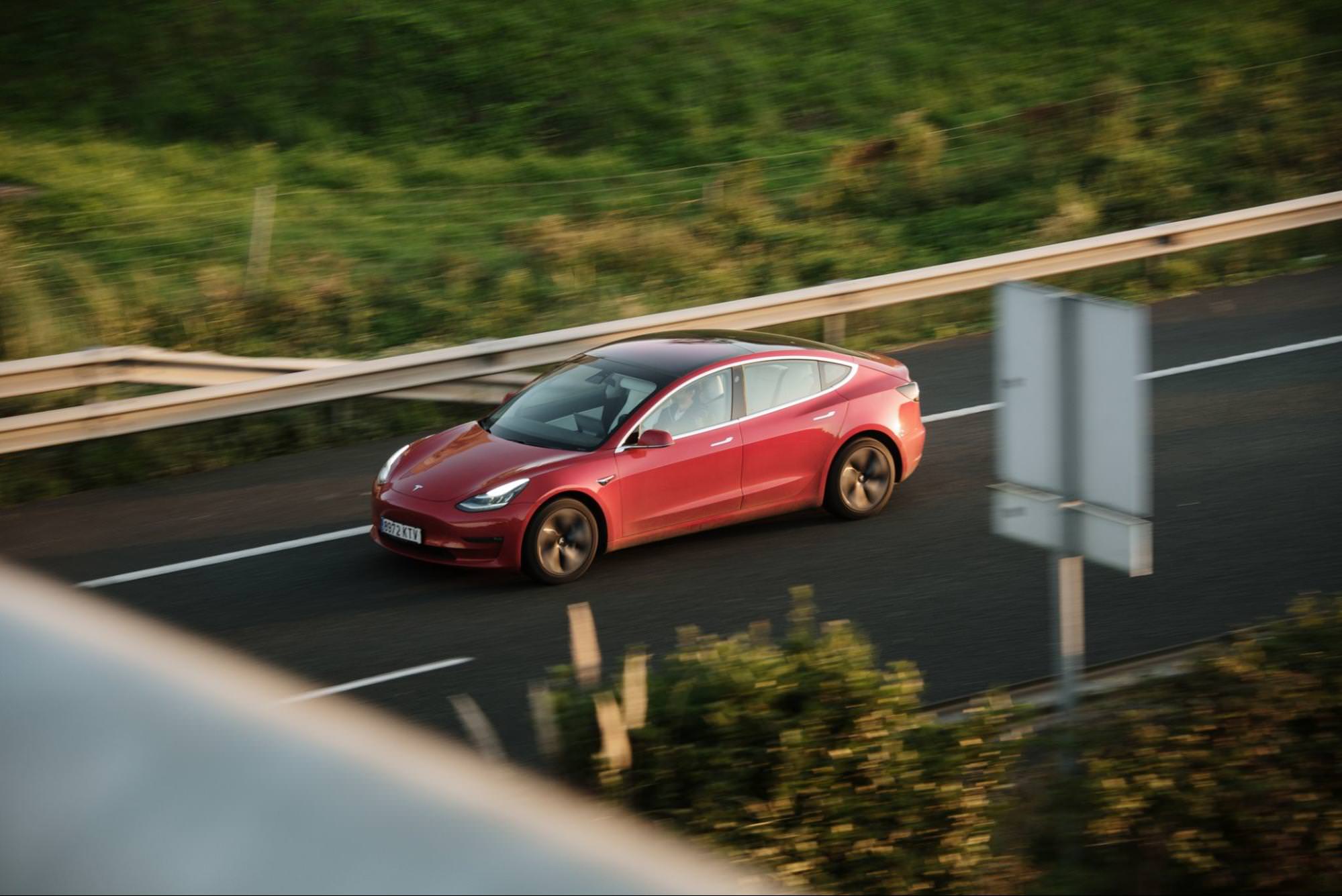
Tesla Model 3
Even with these challenges, there are some good signs ahead.
In markets like Spain, BEVs have held their value better than in other places, showing that demand isn’t the same everywhere.

Image source: Autovista
According to Autovista’s June 2024 report, EVs in Spain are retaining around 49.5% of their original price.
So, there’s no need to be pessimistic just yet! Certain regions are performing better, and there’s still room for optimism depending on local market conditions.
Main challenges in the European EV market
Slower EV sales aren’t happening by chance. A series of key events have contributed to this shift, from price cuts on new cars to changing regulations.
One of the big reasons prices are dropping is that larger, more expensive electric cars are hitting the market. As brands like Tesla and others lower their prices on new models, regular used EVs are becoming less appealing and harder to sell at higher prices.
There will always be a demand for used vehicles, but if people can afford a shiny new luxury car or a larger model at a discount, it’s understandable why they might not go for a used one. That’s not to say there isn’t opportunity—dealers can still find success by focusing on affordable models and appealing to more budget-conscious buyers who are looking for a good deal.
Next, the CO2 emissions regulations in the EU are also shaping the EV market. The current EU’s target is to cut CO2 emissions from cars and vans by 55% by 2030.
|
Year range |
Cars (g CO2/km) |
Vans (g CO2/km) |
|
2020 to 2024 |
95 |
147 |
|
2025 to 2029 |
93.6 |
153.9 |
|
2030 to 2034 |
49.5 |
90.6 |
While these regulations are designed to accelerate the transition to EVs, they can lead to hesitation in the used EV market.
Buyers may be concerned that older models could become less desirable or more costly to maintain as standards evolve.
Still, let’s not forget about the long run, in which the push for newer, cleaner technology could also stimulate demand for more advanced EVs.
Lastly, don’t forget about the role that subsidies for EVs play in the market. These incentives vary by country, and some have even reduced or eliminated them recently.
Germany, for instance, ended its EV purchase subsidies at the end of 2023, which led to a 16.4% drop in EV sales during the first half of 2024. This has had a significant impact on the overall EU market, as explained by a Transport and Environment analysis below.
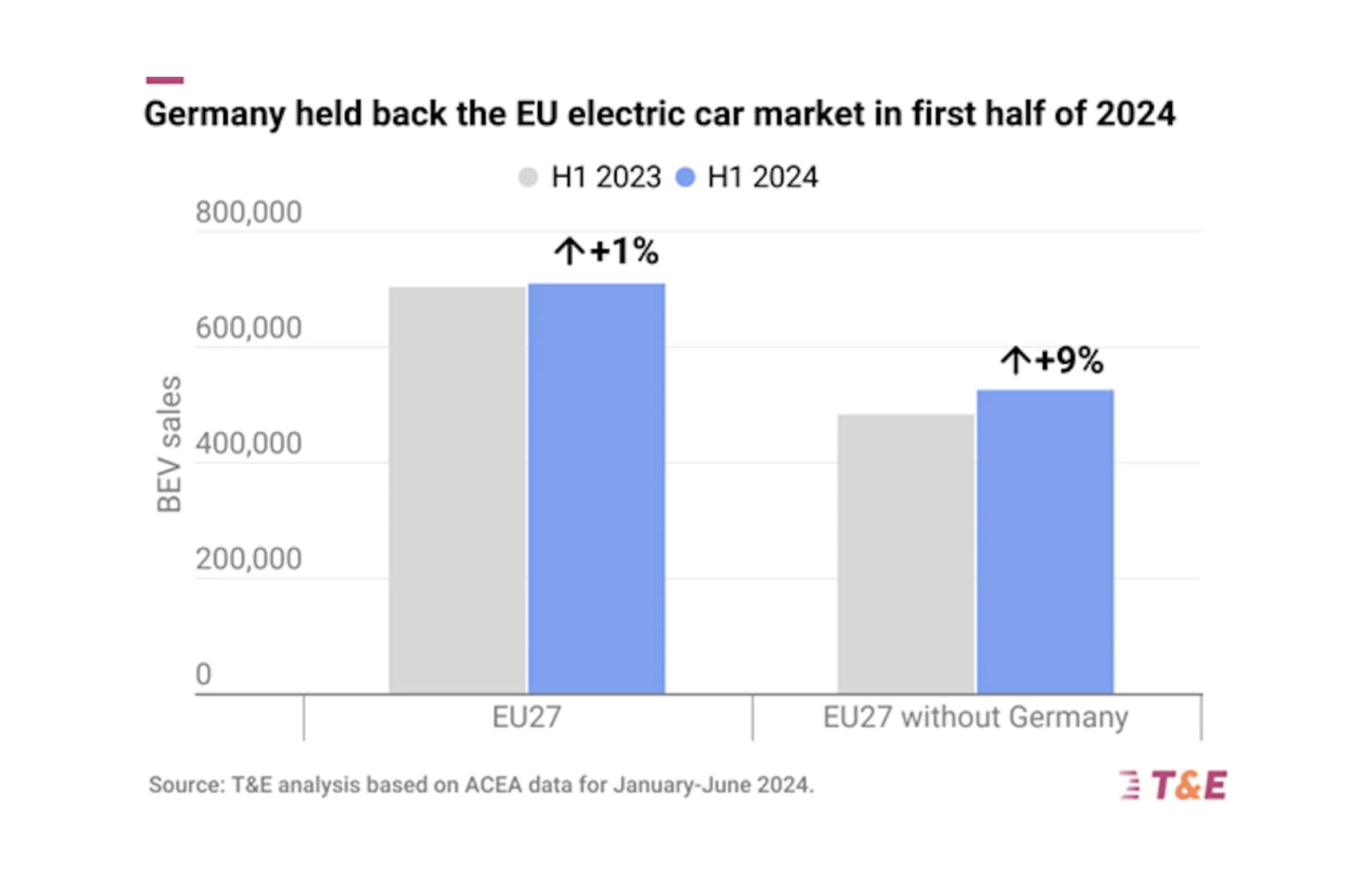
Germany is holding back the overall EU EV market
So, while BEV sales across the EU grew by 1% overall in the first half of 2024, if we exclude Germany, the growth jumps to 9%, showing how much Germany’s subsidy cuts have held back the broader market.
In other words, you should take local conditions into account when planning your inventory.
Some countries, like Spain and France, still offer incentives, continuing to support their EV markets.
2024 top-selling electric vehicles
When it comes to EV sales in Europe for 2024, Tesla is leading the way.
CleanTechnica’s Europe EV Sales Report states that Tesla is dominating the market with Model Y and Model 3 combining a total of 44,000 units sold by June 2024.
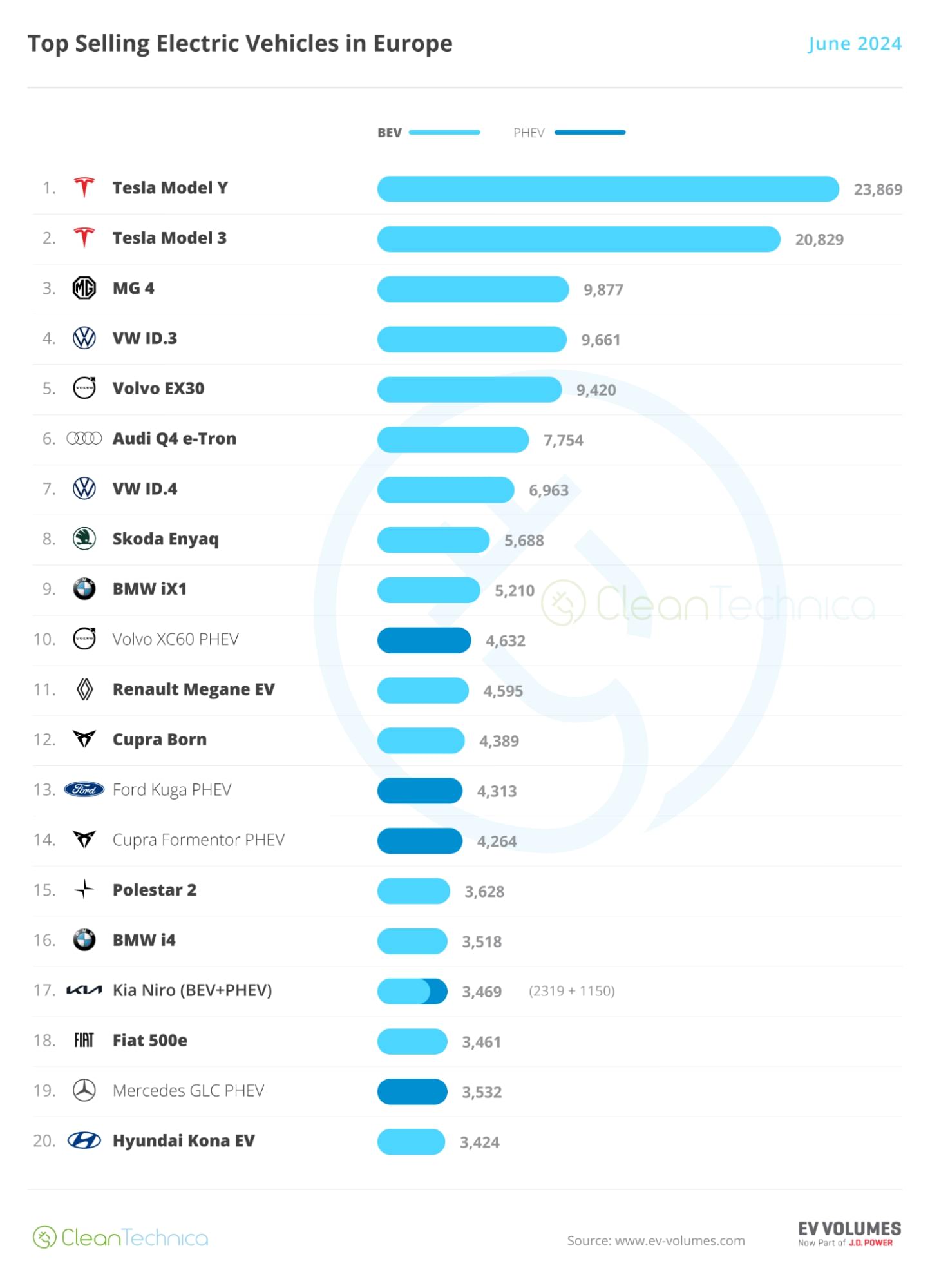
Image source: CleanTechnica
The MG 4 secured third place in the BEV sales rankings with 9,877 units, followed by Volkswagen’s ID.3 with 9,661 units sold.
Volvo and Audi also appear in the top 10, with their BEV sales in Europe staying competitive because of models like Volvo EX30 and Audi Q4 e-Tron.
So, while Tesla is still dominant, European brands like Volkswagen and Volvo are also gaining traction.
2024 top-selling used electric vehicles
Of course, the list of new EV top sellers and used EV best sellers isn’t exactly the same. While you’ll find the latest models among new top performers, the used market focuses more on affordability and practicality.
That’s why used car dealers can benefit from stocking affordable, high-demand models like the Nissan Leaf, Volkswagen e-Golf, and Renault Zoe.
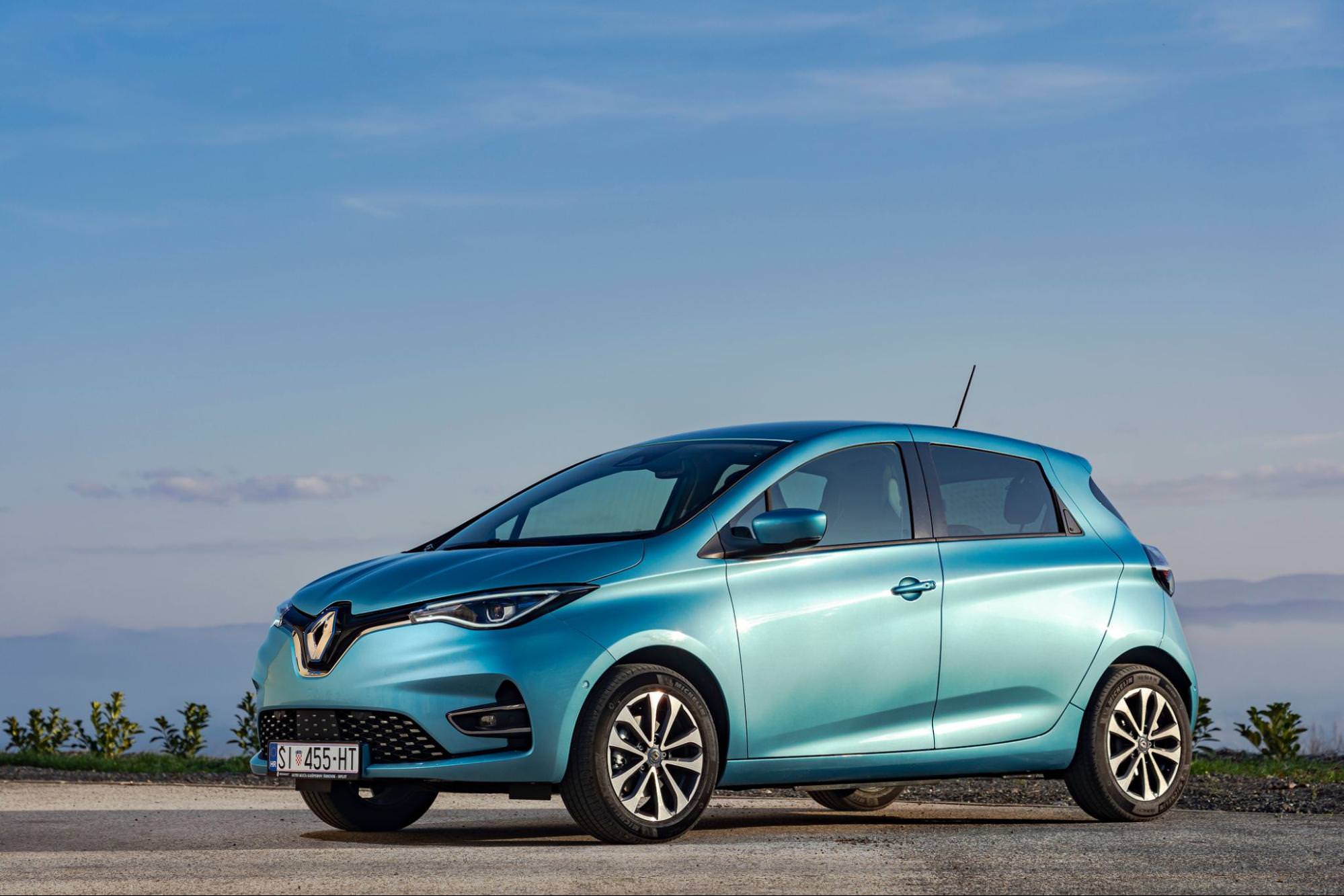
Renault Zoe
These models are popular for their reliability and accessible pricing.
For example, you can find a usedc Nissan Leaf on eCarsTrade for €11,000-12,000, while a used Renault Zoe, another strong seller, is available from €9,000 to €12,000.
Used electric vehicles on eCarsTrade
So, do the current trends mean that you should only stock traditionally fueled cars?
Absolutely not.
Although there’s now pressure on dealers’ profits due to falling prices, there are clear signs that buyers will turn back to EVs. In case you want a piece of the future market for yourself, you’ll have to find a reliable supplier of used electric vehicles.
With eCarsTrade, you can browse and buy EVs from various auctions. They are updated weekly, so you can keep your inventory fresh.
Most vehicles listed on eCarsTrade have been inspected by independent experts, allowing you to make confident, informed purchases. Additionally, you can always run the vehicle’s VIN number through a VIN check tool to access all its information and history.
Whether you’re looking for premium models or more regular EVs, you’ll find a range of options that meet your dealership’s needs.
Remember that the practice of buying and selling used electric cars often includes battery lease, especially with Renault models.
A battery lease means the car’s battery is leased separately, with monthly payments based on mileage. While this can help lower upfront costs, it’s important to check the listing details.
On eCarsTrade, we make this process simple. Listings clearly state if a vehicle requires a battery lease, so you can know what to expect with each car.

If you want profits in a year or two, the time to start investing in EVs and hybrids is now, so head over to eCarsTrade and browse the latest listings.
EV market forecast for 2025
Looking ahead to 2025, it’s likely that prices will stay low for a while, with experts not expecting stabilization until at least next year.
With battery costs dropping and Lithium Iron Phosphate batteries becoming more common, new EVs will keep getting cheaper.
You could also see a wave of used electric commercial vehicles entering the market, but selling them might take longer—on average, 129 days compared to quicker sales of petrol or diesel cars.
As a dealer, you might need to adjust your approach, focusing on long-term strategies like offering extended leases or re-leasing used EVs.
What does it mean for car dealers?
Like always, you should prepare your dealership for a mix of positives, challenges, and some uncertainties.
The good: Battery prices are dropping, making new EVs more affordable, which could bring more buyers to your dealership. Instead of relying on a few big sales, you’ll be planning for more consistent, smaller transactions as buyers seek budget-friendly options.
The bad: Again, used EV prices are continuing to fall, but that’s not always good news. It’s taking longer to sell used EVs to private customers, so you might want to consider working with fleet buyers if that suits your dealership’s business model.
The ugly: Stricter European CO2 emissions regulations are coming, and while that’s great for the planet, it’s not easy for dealers. Meeting the new standards may require you to adjust your offerings and rethink your pricing strategies.
All in all, staying flexible is crucial for dealers. You’ll need to adapt to local market conditions and focus on offering well-priced, high-demand models. There’s also an option to temporarily focus on offering petrol and diesel vehicles if they align better with your buyers’ preferences.
So, keep your eye on changing regulations, trends, and incentives, and you’ll navigate the evolving market with success. Times may be changing, but there’s always room for opportunity for strategically-planned dealerships.
eCarsTrade's blog features curated lists and rankings of:
Browse our used cars
